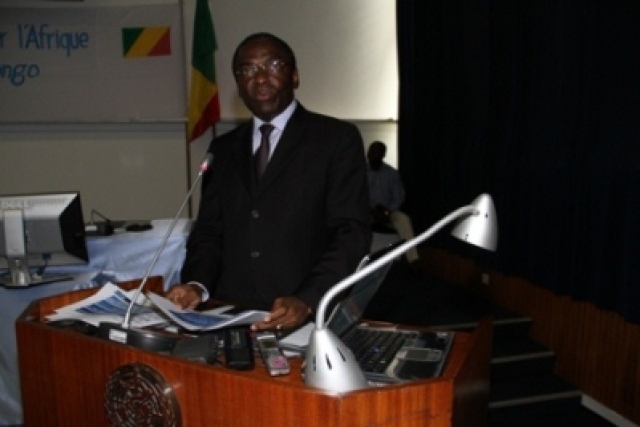Dr Sambo calls for intensified action to address major health challenges facing Africa
 Brazzaville, 15 February 2013 – The World Health Organization (WHO) Regional Director for Africa,
Brazzaville, 15 February 2013 – The World Health Organization (WHO) Regional Director for Africa,
Dr Luis Sambo, has called on African governments together with their health partners to intensify action in addressing three of the major health threats facing the Region: communicable diseases, noncommunicable diseases and public health emergencies.
He made the call on Friday in Brazzaville during his annual briefing on the state of health in the African Region. The event was attended by representatives of international organizations and members of the diplomatic community accredited to the Republic of Congo.
Addressing the envoys, the Regional Director put emphasis on the need for countries “to strengthen their health systems with a view to ensuring equitable access to health services”.
Communicable diseases
Dr Sambo outlined the major communicable diseases facing the Region as malaria, tuberculosis (TB) HIV/AIDS, neglected tropical diseases, epidemic and pandemic-prone diseases and vaccine preventable diseases.
He stated that the Region records 80% of all global episodes of malaria, 90% of deaths, and a very high rate of malaria-related deaths among children and pregnant women. However, on-going efforts to address this problem have reduced malaria deaths by more than 50 % in 12 countries. The percentage of homes using long lasting insecticide-treated nets has also increased from 3% in 2000 to 53% in 2012.
TB remains a major public health problem in the African region, with 500,000 deaths annually that account for over 26% of notified TB cases in the world. While 19 countries have been able to treat over 85% of those affected, the co-infection of TB and HIV as well as drug-resistant TB and Multi-drug Resistant TB (MDR-TB) continue to complicate treatment of the disease.
The Regional Director highlighted progress made in the prevention, control and treatment of HIV/AIDS but said that 1.2 million deaths recorded in the Region in 2011 is a matter of concern. He also noted that progress was made in tackling neglected tropical diseases. However more needs to be done to control elephantiasis, river blindness, bilharzia, trachoma, soil transmitted infections such as hookworm, roundworm and whipworm among others.
Noncommunicable diseases
Referring to noncommunicable diseases, the Regional Director pointed out that tobacco use, lack of exercise, unhealthy diets and harmful use of alcohol are responsible for the rising trend of heart diseases, cancer, diabetes, chronic respiratory diseases, mental health problems, violence and trauma. It is projected that by 2025, about 55% of deaths in the African Region will be caused by noncommunicable diseases.
African Public Health Emergency Fund
Dr Sambo told the audience that the proposed African Public Health Emergency Fund (APHEF) was now ready to take off with the contribution of $1.8 million by five countries – Angola, Eritrea, Ethiopia, the Democratic Republic of Congo and Rwanda. The expected annual contribution is $50 million. He appealed to countries to pay up their outstanding contribution for 2012.
Climate Change
Drawing attention to the impact of climate change, he stressed that it was time for all to face the realities of its projected effects which include increasing the population at risk for malaria in the Africa Region to an estimated 170 million people between now and 2030.
In his remarks, the Minister of Health and Population of Congo, Mr François Ibovi, stated that his government had decided to prioritize disease prevention, improved access to quality medicines, hospital hygiene and quality health professionals in improving the country’s health system.
“Strengthening the technical skills of health workers, especially doctors, nurses and managers of health services will help improve the performance of health services”, he said.
Speaking on behalf of the diplomatic community, the Dean of the Diplomatic Corps in Brazzaville, Mrs Marie Charlotte Fayanga, said she was confident that more countries will make their contribution to the Fund.
Mrs Fayanga, who is the Ambassador of the Central African Republic to Congo, also appealed to decision- and policy-makers in the health sector in the African Region to ensure that people in the rural areas also had access to impregnated bed nets and antiretroviral therapy.
The next meeting between Dr Sambo and the Diplomatic Corps accredited to Congo is expected to be held in February 2014.
___________________________________________
For more information, please contact:
Boniface Biboussi ; + 242 055515238/066558550; biboussib [at] cg.afro.who.int (biboussib[at]cg[dot]afro[dot]who[dot]int); bbiboussi [at] yahoo.fr (bbiboussi[at]yahoo[dot]fr)
Joana Teixeira ; tel : +47-241-39382 ; teixeiram [at] afro.who.int (teixeiram[at]afro[dot]who[dot]int)
Samuel Ajibola ; tel : +47-241-39378 ; ajibolas [at] afro.who.int (ajibolas[at]afro[dot]who[dot]int)
Collins Boakye-Agyemang; tel + 4724139420/+242 066142401; Boakyec [at] afro.who.int (Boakyec[at]afro[dot]who[dot]int)


